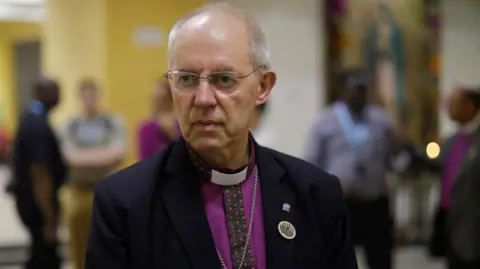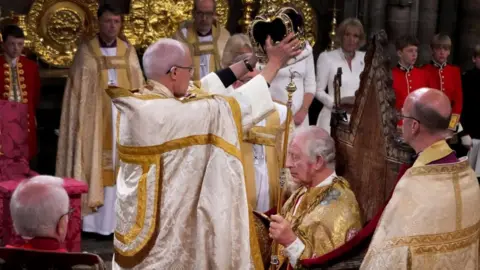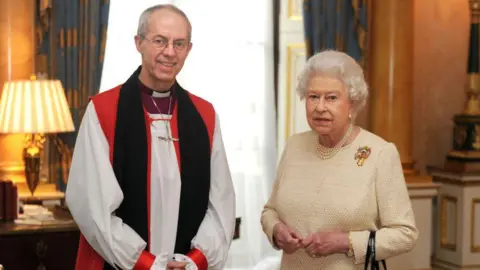‘Best interests of the Church’: Justin Welby quits over abuse scandal

 Reuters
Reuters
The Archbishop of Canterbury has announced he will step down from his role following a damning report into a prolific child abuser associated with the Church of England.
The review found that Justin Welby, 68, “could and should” have reported John Smyth’s abuse of boys and young men to police in 2013.
In a statement, Mr Welby said that “it is very clear that I must take personal and institutional responsibility” for his response after he was first told about the abuse.
“I believe that stepping aside is in the best interests of the Church of England.”
“I hope this decision makes clear how seriously the Church of England understands the need for change and our profound commitment to creating a safer church,” Mr Welby said.
“As I step down I do so in sorrow with all victims and survivors of abuse,” he added.
A spokesperson for Prime Minister Keir Starmer said he “respects the decision that has been taken and his thoughts remain first and foremost with all the victims”.
Last week’s report concluded that Smyth “could and should” have been reported to the police when Church leaders including Mr Welby were presented with details of his abuse in 2013.
Inaction from the Church represented a “missed opportunity to bring him to justice,” the report said.
In his resignation statement, Mr Welby said he was “told that police had been notified” at the time and that he “believed wrongly that an appropriate resolution would follow”.
He also spoke of his “profound sense of shame at the historic safeguarding failures” of the Church over the days since the report was published.
“For nearly twelve years I have struggled to introduce improvements. It is for others to judge what has been done,” he said.
Archbishop of York Stephen Cottrell said the Church had made “real progress” in safeguarding under Mr Welby’s leadership but added: “There is much further to go.”
He told the BBC the Church was “a bit polarised and divided” but said “facing up to failure is the way to bring healing and reconciliation”.
The Church’s lead safeguarding bishop, Joanne Grenfell, said the failings identified in the report meant it was “now necessary for others to take up the baton”.
She said Mr Welby’s resignation “does not absolve any of us from bringing about the wholesale changes in culture and leadership that are essential in every part of the Church”.
The archbishop had been facing mounting pressure to resign in the days since the report’s publication.
The Bishop of Newcastle, Helen-Ann Hartley, told the BBC on Monday that Mr Welby’s position was “untenable” after the report.
Three members of the Church’s parliament, the General Synod, had accused the archbishop of “allowing abuse to continue” between 2013 and Smyth’s death in 2018.
They launched a petition calling for Mr Welby’s resignation, which had been signed by more than 13,000 people by Tuesday afternoon.
Speaking after the archbishop’s resignation, one of the Synod members who started the petition said: “I think it’s sad that it’s taken so long for meaningful action to take place.”
The Rev Dr Ian Paul added that he hoped that Mr Welby’s resignation would be the first step towards “cultural change in [the Church’s] senior leadership”.
Clare MacLaren, Canon Provost of Sunderland Minster, told the BBC Mr Welby’s resignation was “not before time”.
“It’s something that’s been brewing for the last 24 hours at least,” she said. “It would have been good if he’d done it immediately.”

 Reuters
Reuters
The review said that from July 2013, “the Church of England knew, at the highest level, about the abuse that took place in the late 1970s and early 1980s,” naming Mr Welby specifically.
It found that “several opportunities were missed” to formally report the abuse to police.
One survivor of Smyth’s abuse told the BBC the archbishop and the Church had effectively been involved in a “cover-up”.
The archbishop himself, in his resignation statement, said the report had “exposed the long-maintained conspiracy of silence about the heinous abuses of John Smyth”.
Smyth was a prominent barrister as well as a lay preacher – a member of the congregation who delivers sermons but is not ordained – who ran summer camps for young Christians.
The report accused him of attacking up to 30 boys he had met at the summer camps during the 1970s and 1980s.
He singled out boys attending the camps and in sessions at leading public schools, including Winchester College, before taking them to his home and beating them with a garden cane in his shed.
The report by Keith Makin described Smyth’s abuse as a “clearly sexually motivated, sadistic regime” of beatings.
Smyth then relocated in the 1980s to Zimbabwe, and later South Africa, where he is alleged to have abused a further 85 to 100 “young male children aged 13 to 17”.
It was not immediately clear when the archbishop would leave his post.
“It is my duty to honour my constitutional and Church responsibilities,” he said. “So exact timings will be decided once a review of necessary obligations has been completed.”
He said he would meet victims and delegate his current safeguarding responsibilities “until the necessary risk assessment process is complete”.

 Getty Images
Getty Images
Mr Welby was educated at Eton and the University of Cambridge.
He spent 11 years in the oil industry before retraining as a priest.
He was ordained in 1992 and became a vicar in Warwickshire, a Canon of Coventry Cathedral, the Dean of Liverpool, and the Bishop of Durham before being appointed Archbishop of Canterbury in 2013.
Archbishop of York Stephen Cottrell told the BBC the ordination of women as bishops and his work in racial justice were key parts of Mr Welby’s legacy.
The Archbishop of Canterbury is the head of the Church of England, who leads 85 million Anglicans in 165 countries around the world. They also have a wider constitutional role in the UK.
The process for choosing Justin Welby’s replacement reflects that.
A nationwide consultation will be held asking people in and outside the Church of England what they want from the next archbishop. That is expected to take several months.
Church and government officials will summarise those views, along with feedback from the Church representatives in Canterbury, the area the archbishop technically oversees. That information will form the basis of creating a longlist of suitable candidates invited for interview.
No one applies for the role. Those chosen for interview don’t have to be from the Church of England and they don’t have to be bishops, although they are likely to be.
The candidates will then be interviewed by a committee of 17 people. The chair is appointed by the prime minister and the members will include representatives from around the global Anglican Communion, the General Synod, or parliament, as well as at least one bishop.
At least two-thirds of the committee members must agree before a decision is made.
The process of choosing his successor is likely to take at least six months.
BBC Action Line: If you have been affected by issues in this story, find out what support is available here.








